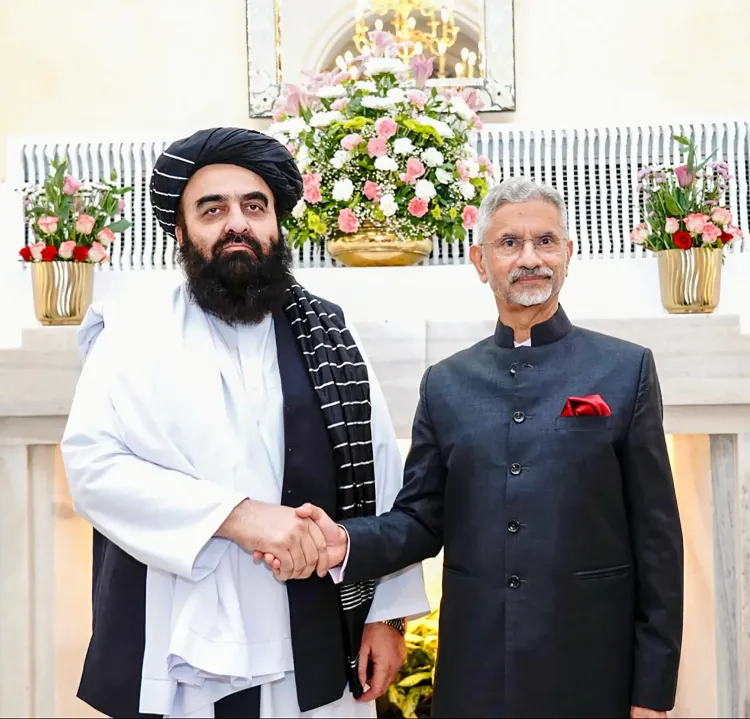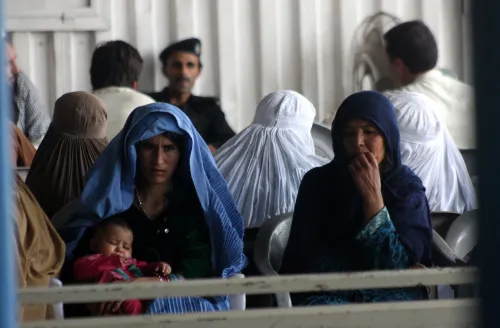Is Pakistan Losing More Than Just Diplomatic Ground with Kabul Turning to India?

Synopsis
Key Takeaways
- Pakistan's relationship with the Taliban has soured, leading to increased tensions.
- Afghanistan's diplomatic overtures towards India signal a strategic loss for Islamabad.
- India's investments in alternative trade routes bypass Pakistan.
- The Taliban's refusal to act as a proxy for Pakistan alters the regional balance.
- Pakistan faces significant challenges in managing its ties with the Taliban and countering India's influence.
New Delhi, Oct 10 (NationPress) Pakistan could never have foreseen that a group it once nurtured and utilized to instigate terror in neighboring nations would eventually govern and understand that diplomacy does not emerge from the barrel of a gun.
In response to the situation, Pakistan's Defence Minister Khawaja Asif remarked that Islamabad has 'run out' of tolerance regarding the use of Afghan territory by 'terrorists targeting Pakistan'.
He made an unusual assertion, stating that Afghans have always stood with India 'yesterday, today, and tomorrow'.
If his country had indeed provided support to Afghan refugees, it was to foster a militia rather than out of genuine compassion. This rhetoric coincides with Afghanistan’s Foreign Minister Amir Khan Muttaqi visiting India.
Pakistan has soured its relations with the Taliban, conducting attacks on Afghanistan’s border regions, including aerial bombings, and returning thousands of refugees to an uncertain fate.
Kabul has consistently refused to acknowledge the Durand Line – hastily drawn by British colonialists – as a legitimate border.
The porous regions have experienced sporadic skirmishes, impacting trade and transit. Following the withdrawal of US-led forces, Islamabad anticipated that the Taliban would remain eternally grateful and comply with its demands, but the regime’s assertiveness has disrupted that expectation. Kabul’s diplomatic gestures toward New Delhi have unsettled Pakistan.
Although India does not officially recognize the Taliban government, its practical engagement indicates a shift in Kabul’s foreign policy orientation. For Pakistan, this signifies a strategic loss and potential threat.
India's expanding relationships with Kabul, along with its strategic partnership with Iran, heighten these apprehensions.
The potential increase in India’s diplomatic and trade relations with neighboring nations serves as a cautionary signal for Islamabad.
Simultaneously, Pakistan’s economic relationships with Afghanistan have deteriorated, with border closures, refugee deportations, and diplomatic tensions disrupting transit routes.
India’s investment in alternative corridors such as the International North–South Transport Corridor (INSTC) and Chabahar completely bypasses Pakistan.
However, after the re-imposition of sanctions against Iran and especially the Chabahar Port, foreign companies have become reluctant to engage in the port's expansion.
India assumed control of operations in 2018, utilizing it for trade with Iran and other nations, and also sending relief materials to Kabul. Islamabad is closely monitoring Muttaqi’s visit to India, fearing diplomatic isolation, especially as India engages with Afghanistan, Iran, and other Central Asian countries, putting Pakistan at risk of being excluded from regional discussions.
The increasing Indian presence could restrict its operations in intelligence gathering, surveillance, and regional influence. Therefore, Afghanistan’s shift towards India intensifies pressure on Pakistan’s western border.
The Taliban’s refusal to serve as Islamabad’s proxy and India’s growing goodwill among Afghans have transformed the strategic landscape. Pakistan’s perception of India’s advantage in Afghanistan reflects a sense of strategic reversal.
What was once a sphere of influence has turned into a source of insecurity.
India’s soft-power diplomacy, infrastructure investments, and pragmatic engagement with the Taliban have enabled it to gain ground almost without military presence.
Islamabad now confronts two significant challenges – managing deteriorating relations with the Taliban and countering India’s increasing influence. However, considering statements like those made by Khawaja Asif, both challenges seem distant for Pakistan.
As regional dynamics evolve, Afghanistan will remain a pivotal point in South Asia’s geopolitical chessboard – one where Pakistan’s traditional strategies may no longer suffice.










